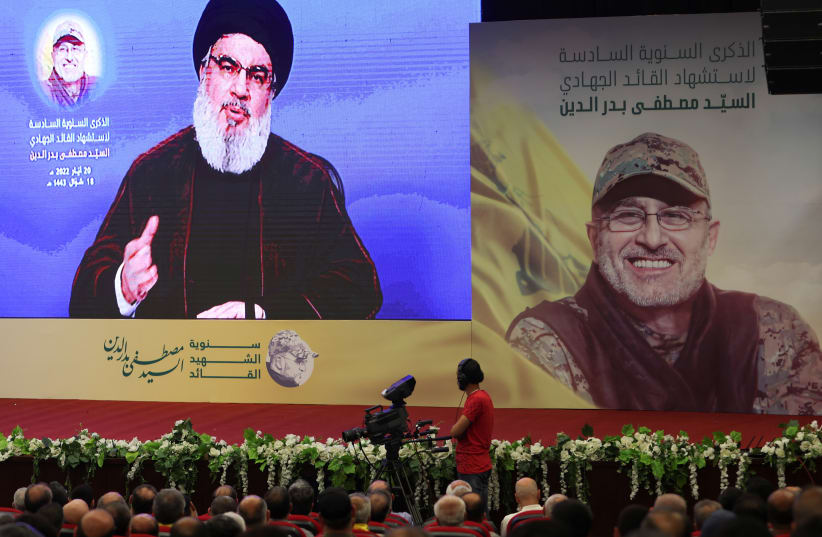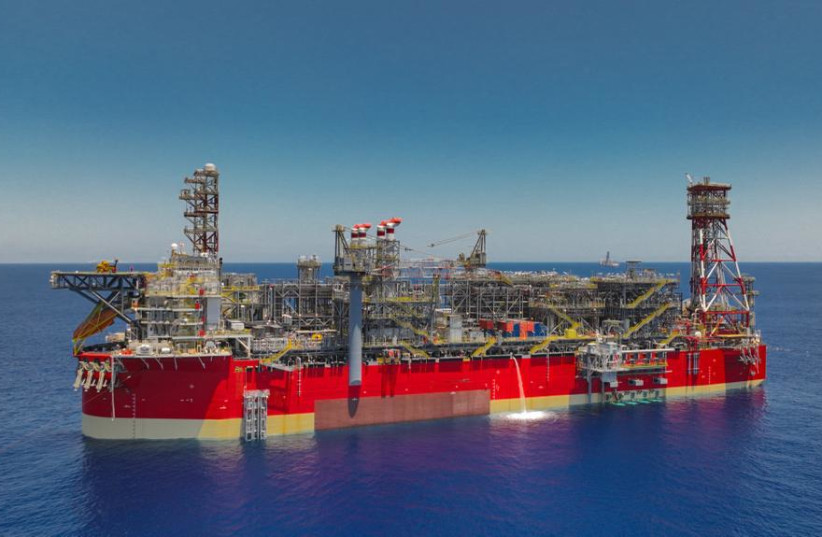Hezbollah leader Hassan Nasrallah once again warned that Israel "faces a problem" if it begins to pump gas from the Karish gas rig in a speech in Baalbek, Lebanon on Saturday.
Nasrallah gave a long speech, during which he also praised Hamas-Syria ties.
Lebanon is waiting to receive its demands, he added, referring to a US-brokered deal on a maritime boundary between Israel and Lebanon that is in the works. "Lebanon is facing a golden opportunity that may not be repeated to address its crisis," Nasrallah declared.
He further stated that the extraction of gas from the Karish field was a “red line,” adding, "We gave the negotiations a real opportunity with the aim of extracting Lebanon's gas, and we did not look for any problem."
Now Nasrallah says that Hezbollah has "sent a very strong message, far from the media, that [Israel] faces a problem if it begins extraction from the Karish field before Lebanon obtains its rightful demands."
Hezbollah has looked askance at the US-brokered talks and in the past has accused the US of backing Israel in the talks. However, some voices also say that Lebanon has now achieved many of its goals in maritime discussions. Hezbollah says that it is not part of the talks since being part of them would be a form of recognizing Israel.
Israel and the US have "sufficient data" about Hezbollah's objection to Israel using the gas field's resources, he continued.
Israel-Lebanon border concerns
He warned Israel is heading toward an escalation on its northern border, "whether the [Iran] nuclear agreement is signed or not," if Lebanon is dissatisfied with the maritime border dispute deal.
Hezbollah is backed by Iran and claims to be “resisting” Israel. "We are not part of the negotiations, and our eyes are all on Karish and our missiles as well," the Hezbollah leader said.
He said Hezbollah is not joking and Israel should take the threat seriously. “In the event that Lebanon does not obtain its rights, which are demanded by the Lebanese state, we are going to escalate, whether the nuclear agreement is signed or not.”
The Hezbollah leader also said that any modifications to the UNIFIL mandate are a trap for Lebanon. According to him, "the last decision is an Israeli mine and trap, and it would have opened the door to great dangers.”
The UN has renewed the mandate of the peacekeepers for a year. Hezbollah claims article 16 of the mandate is problematic in that UNIFIL doesn’t need prior permission to perform its tasks.
Hamas-Syria relations
Nasrallah also praised the recent increase in relations between Hamas and the Syrian regime. He said recent statements represent a positive step in regards to increasing ties between Hamas and Syria. “We look forward to Syria regaining its role and position in the Arab and Islamic nations, and we support all efforts for its stability, prosperity and progress," he said.
According to reports Hamas said that it would continue developing solid ties with Syria.
In a press statement, Hamas said that the ties with Syria "will serve our nation and just causes, with the Palestinian cause at its core, especially in light of the accelerating regional and international developments." Hamas had been forced to close its offices in 2012 due to the Syrian civil war. Islamic Jihad, an Iranian-backed Palestinian group, had remained in Damascus. Iran also backs Hamas. "Hamas has a constant strategy and keenness to develop and strengthen its ties with its Arab and Islamic surroundings, and all those who support the Palestinian cause and the resistance factions in the Palestinian territories," the Hamas terrorist group statement said.
Gantz: Hezbollah, Lebanon could pay 'heavy price'
On Thursday, Defense Minister Benny Gantz warned that Lebanon would pay the price for any Hezbollah attack on its offshore Karish gas field, even as he said he hoped a deal to set a maritime boundary in the north was close to completion.
"If [Hezbollah leader Hassan] Nasrallah wants to try and harm and to complicate this process, he is welcome to do so," Gantz said. "The price is Lebanon."
US envoy Amos Hochstein appears to be on the edge of concluding a deal between the Lebanese and Israeli governments to set a maritime border off the Mediterranean Sea, as The Jerusalem Post reported in August.
Finalizing the deal has become increasingly urgent given that the Karish gas field is set to start production next month.
Some background
Hezbollah’s continued threats to the Karish field and claims it will escalate raise serious questions about any maritime deal with Lebanon. However, reports said last week that a deal was almost complete. The agreement would be an important milestone.
Hezbollah nevertheless holds the Lebanese government hostage, with widespread control and blackmail of institutions in Lebanon, including the Presidency. It also controls southern Lebanon and traffics rockets and drones into the country which threaten Israel.

